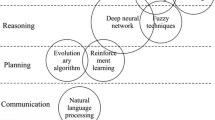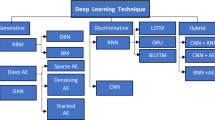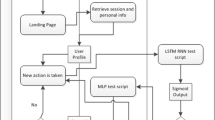Abstract
The expanding approval of e-learning structure has made the need for the customized suggestion prototype which can be utilized to advance the successful learning condition for the learners. Customized suggestion model is a particular sort of data separating framework used to recognize a lot of articles that are applicable to a e-learners. In this paper, we mainly propose the efficient e-learning recommendation (EELR) system for user preferences using hybrid optimization algorithm (HOA). EELR system constructs a HOA with deep recurrent neural network (DRNN) and improved whale optimization (IWO) algorithm. First, DRNN is utilized to order the e-learner types dependent on these e-learner gatherings, clients can acquire course proposal from the gathering's persuasion. Thereafter, the conduct and the inclinations of the learners are examined via completing the mining of the arrangements watched every now and again by the IWO calculation. Rather than a learner effectively looking for data, recommender frameworks give counsel to students about articles they may wish to analyze. At last, the proposal of the e-learning depends on the appraisals comparing to these arrangements watched often. This proposed system is going to implement and validate in numerous e-learning entries against the client inclinations over some undefined time frame and demonstrated to be more proficiency and exactness contrasted with the customary recommender framework. This strategy can help learners to grasp the knowledge system and learning direction, and improve their learning efficiency. Observation results show that the proposed methodology empowers the asset suggestion to singular clients, which is started from different sources.



Similar content being viewed by others
Data availability
The already existing algorithms data used to support the findings of this study have not been made available.
References
Aher SB, Lobo LMRJ (2013) Combination of machine learning algorithms for recommendation of courses in E-learning system based on historical data. Knowl-Based Syst 51:1–14
Aparicio M, Bacao F, Oliveira T (2016) Cultural impacts on e-learning systems’ success. Internet Higher Educ 31:58–70
Benhamdi S, Babouri A, Chiky R (2017) Personalized recommender system for e-Learning environment. Educ Inf Technol 22(4):1455–1477
Bourkoukou O, El Bachari E, El Adnani M (2016) A personalized e-learning based on recommender system. Int J Learn Teach 2(2):99–103
Caeiro-Rodríguez M, Santos-Gago JM, Lama M, Llamas-Nistal M (2015) A keyword recommendation experiment to support information organization and folksonomies in edu-area. IEEE RevistaIberoamericana de TecnologiasdelAprendizaje 10(2):60–68
Cuéllar MP, Delgado M, Pegalajar MC (2011a) Improving learning management through semantic web and social networks in e-learning environments. Expert Syst Appl 38(4):4181–4189
Cuéllar MP, Delgado M, Pegalajar MC (2011b) A common framework for information sharing in e-learning management systems. Expert Syst Appl 38(3):2260–2270
Dascalu MI, Bodea CN, Lytras M, De Pablos PO, Burlacu A (2014) Improving e-learning communities through optimal composition of multidisciplinary learning groups. Comput Hum Behav 30:362–371
Dorça FA, Araujo RD, De Carvalho VC, Resende DT, Cattelan RG (2016) An automatic and dynamic approach for personalized recommendation of learning objects considering students learning styles: an experimental analysis. Inform Educ 15(1):45
Duwairi R, Ammari H (2016) An enhanced CBAR algorithm for improving recommendation systems accuracy. Simul Model Pract Theory 60:54–68
Ficapal-Cusí P, Boada-Grau J (2015) e-Learning and team-based learning. Practical experience in virtual teams. Procedia Soc Behav Sci 196:69–74
Garrido A, Morales L (2014) E-learning and intelligent planning: improving content personalization. IEEE RevistaIberoamericana de TecnologiasdelAprendizaje 9(1):1–7
Harrati N, Bouchrika I, Tari A, Ladjailia A (2016) Exploring user satisfaction for e-learning systems via usage-based metrics and system usability scale analysis. Comput Hum Behav 61:463–471
Klašnja-Milićević A, Vesin B, Ivanović M, Budimac Z (2011) E-Learning personalization based on hybrid recommendation strategy and learning style identification. Comput Educ 56(3):885–899
Klašnja-Milićević A, Vesin B, Ivanović M, Budimac Z, Jain LC (2017) Recommender systems in e-learning environments. In: E-Learning systems. Springer, Cham, pp 51–75
Othman MS, Mohamad N, Yusuf LM, Yusof N, Suhaimi SM (2012) An analysis of e-learning system features in supporting the true e-learning 2.0. Procedia Soc Behav Sci 56:454–460
Ouadoud M, Chkouri MY, Nejjari A, El Kadiri KE (2017) Exploring a recommendation system of free e-learning platforms: functional architecture of the system. Int J Emerg Technol Learn 12(2).
Parkes M, Stein S, Reading C (2015) Student preparedness for university e-learning environments. Internet Higher Educ 25:1–10
Perumal SP, Sannasi G, Arputharaj K (2019) An intelligent fuzzy rule-based e-learning recommendation system for dynamic user interests. J Supercomput 1–16
Rani M, Nayak R, Vyas OP (2015) An ontology-based adaptive personalized e-learning system, assisted by software agents on cloud storage. Knowl-Based Syst 90:33–48
Salehi M (2013) Application of implicit and explicit attribute based collaborative filtering and BIDE for learning resource recommendation. Data Knowl Eng 87:130–145
Salehi M, Kmalabadi IN (2012) A hybrid attribute–based recommender system for e–learning material recommendation. IeriProcedia 2:565–570
Tan W, Chen S, Li L, Li LX, Tang A, Wang T (2017) A method toward dynamic e-learning services modeling and the cooperative learning mechanism. Inf Technol Manag 18(2):119–130
Tan H, Guo J, Li Y (2008) E-learning recommendation system. In: 2008 International conference on computer science and software engineering, vol 5. IEEE, pp 430–433
Tarus JK, Niu Z, Yousif A (2017) A hybrid knowledge-based recommender system for e-learning based on ontology and sequential pattern mining. Futur Gener Comput Syst 72:37–48
Tarus JK, Niu Z, Mustafa G (2018a) Knowledge-based recommendation: a review of ontology-based recommender systems for e-learning. Artif Intell Rev 50(1):21–48
Tarus JK, Niu Z, Kalui D (2018b) A hybrid recommender system for e-learning based on context awareness and sequential pattern mining. Soft Comput 22(8):2449–2461
Tian F, Gao P, Li L, Zhang W, Liang H, Qian Y, Zhao R (2014) Recognizing and regulating e-learners’ emotions based on interactive Chinese texts in e-learning systems. Knowl-Based Syst 55:148–164
Truong HM (2016) Integrating learning styles and adaptive e-learning system: current developments, problems and opportunities. Comput Hum Behav 55:1185–1193
Yao K, Uedo N, Muto M, Ishikawa H, Cardona HJ, Castro Filho EC, Pittayanon R, Olano C, Yao F, Parra Blanco A, ShiawHooi H (2015) Development of an E-learning system for the endoscopic diagnosis of early gastric cancer: an international multicenter randomized controlled trial
Funding
There is no funding from any Research or Funding Agency.
Author information
Authors and Affiliations
Corresponding author
Ethics declarations
Conflict of interest
The authors declare that we have no conflict of interest.
Additional information
Publisher's Note
Springer Nature remains neutral with regard to jurisdictional claims in published maps and institutional affiliations.
Rights and permissions
About this article
Cite this article
Vedavathi, N., Anil Kumar, K.M. An efficient e-learning recommendation system for user preferences using hybrid optimization algorithm. Soft Comput 25, 9377–9388 (2021). https://doi.org/10.1007/s00500-021-05753-x
Accepted:
Published:
Issue Date:
DOI: https://doi.org/10.1007/s00500-021-05753-x




